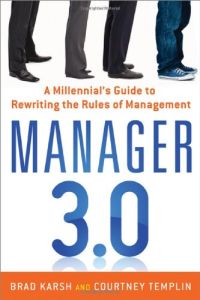Join getAbstract to access the summary!

Join getAbstract to access the summary!
Brad Karsh and Courtney Templin
Manager 3.0
A Millennial’s Guide to Rewriting the Rules of Management
AMACOM, 2013
What's inside?
Millennial managers put a unique spin on emulating the qualities of their predecessors.
Recommendation
Almost everyone in business has an opinion about the millennials, the newest and brashest generation at work. Some consider them whiny narcissists, while others see them as idealistic optimists. Whatever their qualities, by 2015, millennials will outnumber boomers in the workforce. Brad Karsh and Courtney Templin – herself a millennial – define this cohort and explain how it is overturning old ways of doing business. The authors also tell millennials how to trade on their strengths and minimize their weaknesses to become the greatest new generation of corporate managers – version 3.0. By and large, the authors do a fine job. Older employees and managers may not be thrilled with the idea of spending work time on social mixers like “ice-cream outings, board games, chili cook-offs, jigsaw puzzles” or “marshmallow dodgeball.” getAbstract suggests that millennial managers and their employers will find Karsh and Templin’s practical information helpful and worthwhile.
Summary
About the Authors
Brad Karsh is president and founder of JB Training Solutions, where Courtney Templin, who is a millennial, is CEO.

















Comment on this summary